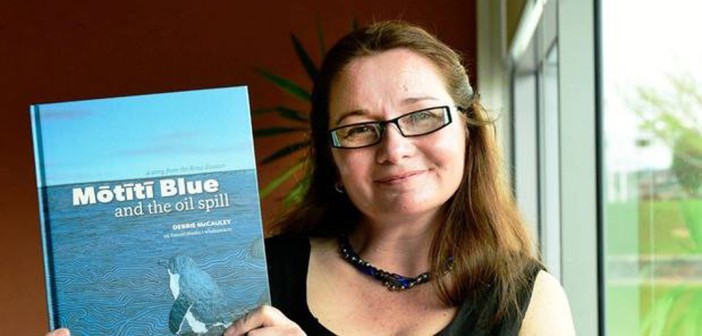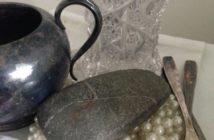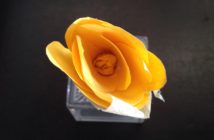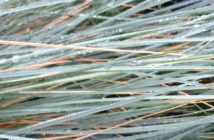Debbie McCauley Tauranga children’s book author welcomes us to the formal launch of the bilingual edition of Motiti Blue: The Story of the Oil Spill The Rena Disaster. Translated into te reo Maori by Tamati Waaka).
It’s a Sunday afternoon above the Tauranga City Library in the spacious and lightfilled staff cafeteria. Debbie is wearing a blue patterned skirt – it’s penguins, lots of little penguins. There’s a Ken Done reminiscent fabric seascape draped across the bank of food cabinets and a large and informative poster about the Rena incident decorating the front of the speaker’s podium. On the afternoon tea-table is a large square cake – irridescent blue icing and chocolate lettering; around the sides are those little chocolate fish. There is a programme on each of the seats. The room is filling.
Sonny Ranapia, a Motiti Island kaumatua opens the afternoon event. Then Debbie stands to speak about the environment and the wildlife habitat and how lessons must be learned from the Rena incident. Then Debbie and Sonny read the story of Motiti Blue first in te reo Maori and then in English.
I’ve seen Mayor Stuart Crosby at many of Tauranga’s arts and cultural events and he is here to speak today. He praises Debbie’s work as a children’s story, as an educational work and for its bilingual nature. He then briefly outlines the events; community and bureaucratic responses to the coastal pollution. He notes the skill of the salvors and how “lucky” we were that they were able to remove a large amount of oil from the wreck. He mentions the professionals who removed the oil from the difficult rocks areas. There were 8,000 registered volunteers, many of the young, and Mayor Crosby again endorses their positive contribution:- hard, physical and back-breaking work. Most importantly Mayor Crosby restates his position that the remaining wreck should be removed and how the huge volunteer response has changed the processes which bureaucracy will use in future. He closes by mentioning his walk earlier in the day along the Pilot Bay boardwalk and the Peter Cramond memorial sculpture.
Speaking next is Paul Cuming, a Librarian, ornithologist and photographer. Paul’s come from the Mauao Wildlife Trust open day. He is part of a World Wildlife Oil Response team. While he’s positive and happy about the current local little blue penguin population he share some disturbing information. The most disconcerting thing he reveals is that the toxicity of oil has had a “gene effect” on the birds exposed to the oil. While this will eventually be “bred out” it’s a stark example of the inherent negative effect of chemical products. Paul’s a particularly fluent and entertaining speaker and he provides an excellent insight into all aspects of the disaster’s effects on local bird life. How many birds is it thought were lost (and this includes eggs which had to be left in burrows)? 10,000 and “a generation of penguins”. The formation of the Mauao Wildlife Trust to continue pest control and help survival for generations to come is the note Paul chooses to close his talk.
What next? Debbie asks for 8 volunteers from the audience for an “impromptu play”. Volunteers run from the audience – this is going to be good. While they get costumed and ready we have afternoon tea. That cake, made by Debbie, is a huge and delicious chocolate cake.
The play is outstanding. With simple props and minimal costumes (think fabric, a white forensic suit, bottles of cooking oil and detergent) the volunteers create the story from boat crash to penguin return to the sea. A young boy and girl who had been sitting by me are natural actors and fulfill their roles with unbelievable confidence. I hope this impromptu narrative is included in information they plan to take around the schools; it’s a subliminal way of informing and educating.
Tommy Kapai Wilson, also a noted writer and children’s author stands.. He asks we pray for the return of little Jack (the five-year old washed to sea from a local beach). He notes the Rena incident occurred because the ship was “rushing” to get to port and recounts advice given to him: there are no short cuts.
“… Motiti curses her… the black blood of Rena creeps closer to the shore…”
Sonny Ranapia accepts a copy of the book to drop into the sea on his next trip to Motiti Island: it is a copy for Tangaroa (the God of the Sea) and Motiti Blue. Tommy has also organised for copies of the book and the poster to be provided to schools. We join in song.
Richard Moore, Papamoa Beach living journalist says he hired a light plane on two occasions to photograph the wreck. He tells us he has the “biggest collection of private photos” of the incident and that the photos are interesting and terrible. He recounts the waves at Papamoa Beach were brown, the sands were black and there was an overwhelming smell of chemicals. People were trying to clean it up with plastic shovels and spades. He recounts seeing a white suited man squatting by the water’s edge then diving into the water to retrieve what turned out to be a bad-tempered penguin. The white suited man was part of the Department of Conservation rescue team Richard also praises the community clean up effort. He also closes stating quite clearly the remaining wreckage needs removing from the reef. (Richard’s extensive photographic record can be viewed at richardmoore.com )
A bilingual prayer closes the formal part of the afternoon. Then a crowd gathers round the book selling and signing table. This was more than a book launch – it was an event. Debbie McCauley organised an event with the same degree of preparation and care she put into the creation of her book. Congratulations Debbie (and family).
You can also read Rosemary Balu’s interview with Debbie in ARTbop, October 2014, KUPU & WORD, TAURANGA CHILDREN’S AUTHOR DEBBIE MCCAULEY – the bi-lingual edition of Motiti Blue and the Oil Spill: A Story from the Rena Disaster (translated by Tamati Waaka)





